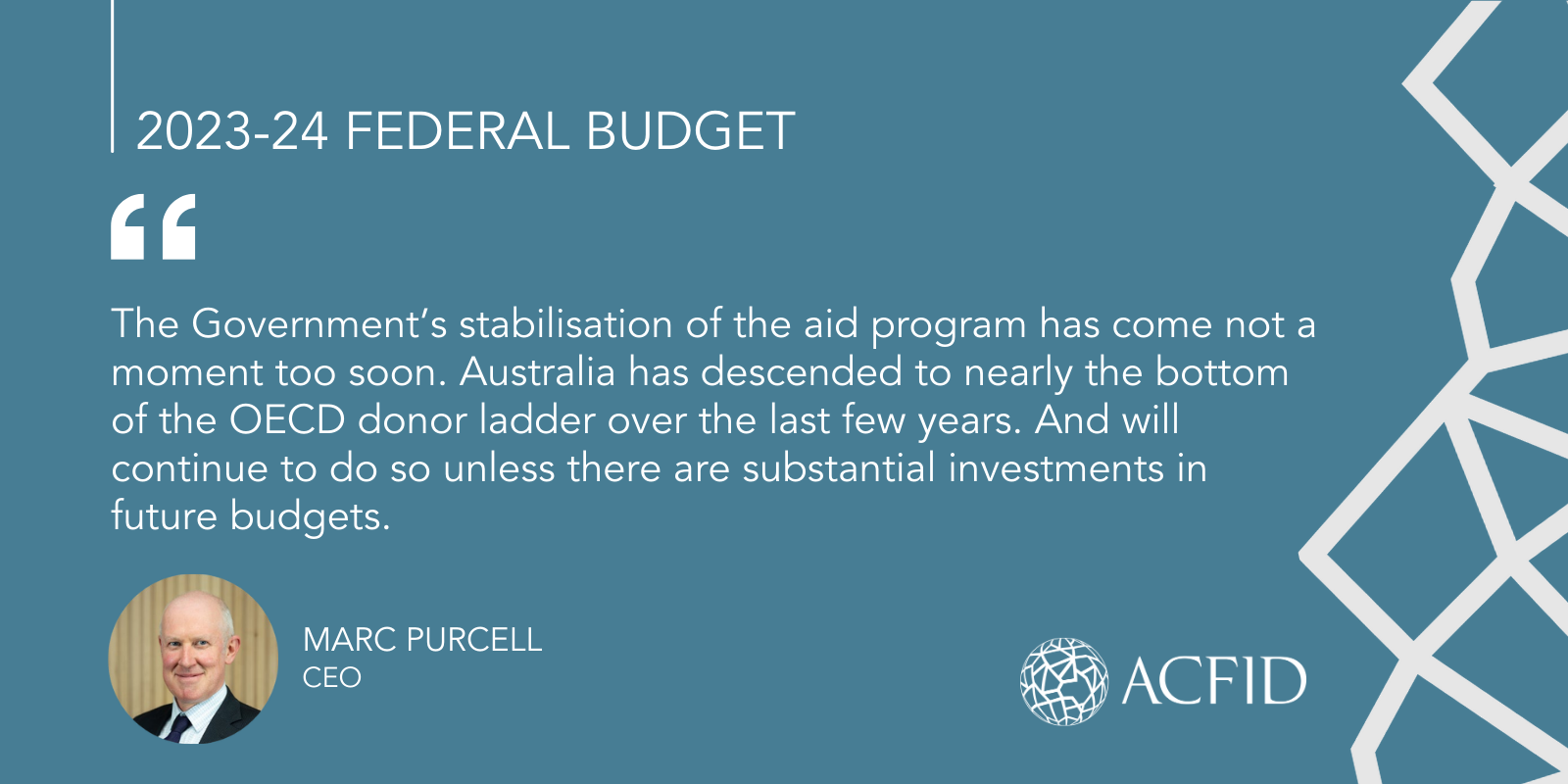
The Australian Council for International Development (ACFID) welcomes the 2023-24 Federal Budget’s measures towards improving Official Development Assistance, describing them as “responsible and sustainable.”
While the Budget contains only modest immediate measures aimed at boosting ODA, ACFID recognises the Government is devoted to sequenced increases of 2.5 percent per year over the longer term from 2026-27 onwards.
“One year in, these measures place Australia’s aid program on stable footing for the future,” said ACFID CEO Marc Purcell.
ACFID also recognises and appreciates funding to increase DFAT’s development capability. This, in combination with the forthcoming new development policy, will form a framework for how overall development can be rebuilt in an appropriate way for the future.
ACFID notes that the funds available for ODA are now $4.77 billion per year. This figure represents an increase of $117.3 million since the October Budget.
A stated commitment to working with civil society across the region is also laudable, and follows sustained advocacy for this by ACFID.
OECD rankings decline
While ACFID notes the Government’s efforts in rebuilding the development program, there is no denying that Australia’s overall performance as a donor is lagging. In figures released in recent months, Australia is ranked 27th of 30 OECD countries that are foreign aid donors, based on ODA amounts as a percentage of Gross National Income (ODA/GNI).
Australia’s ODA to GNI percentage in 2022-23 was 0.20 percent. This coming year, it will fall to 0.19 percent – which represents a historic low. Labor had pledged in its 2021 pre-election platform to achieve at least 0.5 percent ODA/GNI, and to increase aid as a percentage of GNI each year.
“The Government’s stabilisation of the aid program has come not a moment too soon. Australia has descended to nearly the bottom of the OECD donor ladder over the last few years. And will continue to do so unless there are substantial investments in future budgets.
“This has a greater imperative for Australia: as we have stated our intention to bid to host COP 31 in 2026 and to gain a rotating United Nations Security Council seat in 2028/29, Australia must be seen to be walking the talk on being a good global citizen,” said Mr Purcell.
Budget ODA in detail
Highlights of the 2023-24 Budget in terms of ODA:
In Labor’s first Budget in October 2022, it committed $1.4 billion towards ODA, and we are now seeing those funds being allocated. This Budget delivers an increase of $191.8 million over the next four years.
ACFID welcomes the broad uplifts across all countries in the Pacific and Southeast Asia and all sectors with the exception of health. While this is due to the expiration of COVID-19 health measures, the effects of the pandemic are ongoing and health system strengthening must remain a priority, as seen in the Government’s commitment of $620 million towards this earlier this year.
The Government is investing $36.8 million over four years towards DFAT capability, which is an issue that we have been urging greater recognition of for some time.
Despite a topline request by the whole of the aid sector for a 100 percent increase, the Humanitarian Emergency Fund remains the same at $150 million per year, which is a key disappointment. This may negatively impact Australia’s ability to respond to crises as they increase globally.
ACFID welcomes additional measures such as assistance to South East Asia on carbon neutrality and $36 million for the Water For Women program.
In terms of climate, while ACFID recognises that addressing climate change is enshrined in domestic policy, it is vital for this to be reflected in our international outreach. “Pacific countries are telling us that climate change is the top issue they would like Australia’s involvement in. In that context, climate change policy is development policy. The two are intertwined,” said Mr Purcell. ACFID urges the Government to make climate a core pillar of the new development policy.
Further quotes attributable to Marc Purcell:
There are numerous and compounding crises around the world – hunger, drought, conflict and the lingering impacts of the pandemic, development spending is as important as defence. Military hardware alone doesn’t buy us peace.”
“We now need the Government to demonstrate they will rebalance resources in development and diplomacy, in order to create the prosperous and stable region that they speak of wanting to see,” said Mr Purcell.”
For more information or to arrange an interview, please contact [email protected] or call 0401 721 064.








